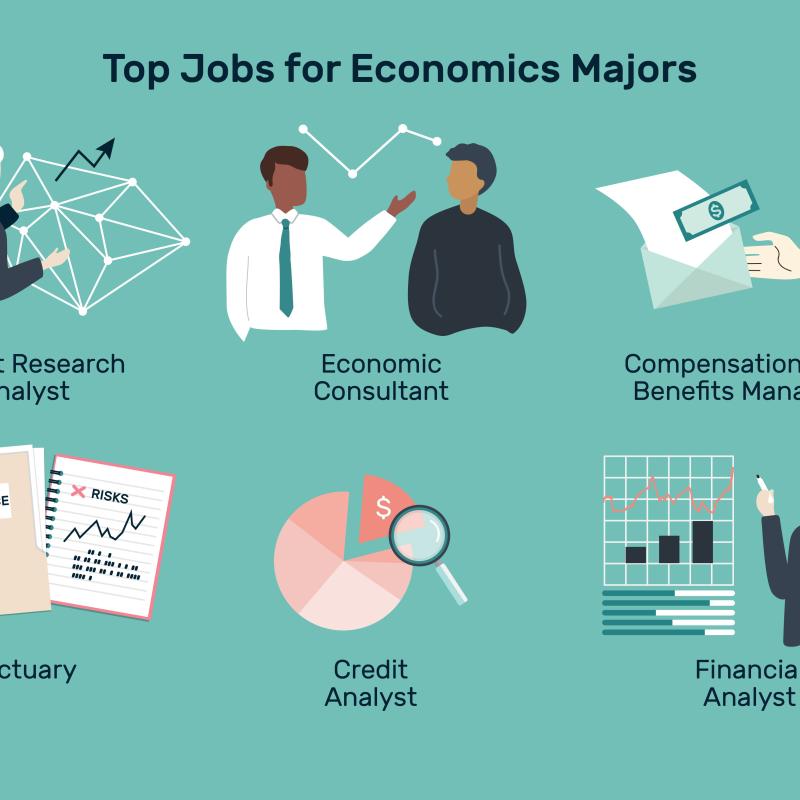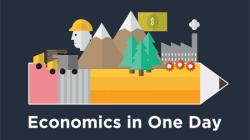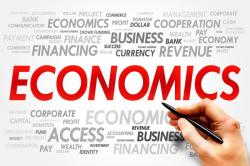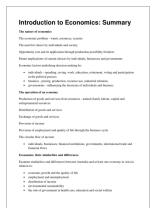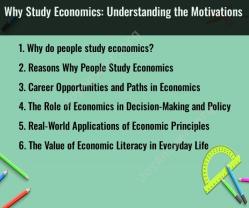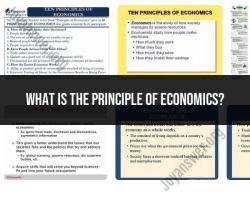What do economics majors do?
Economics majors have a diverse range of career opportunities due to the analytical, quantitative, and problem-solving skills they develop during their studies. Here are some common professional paths for economics majors:
Financial Analyst:
- Role: Analyzing financial data, preparing reports, and providing insights to help businesses make informed investment decisions.
Investment Analyst:
- Role: Assessing investment opportunities, analyzing market trends, and managing investment portfolios for individuals or organizations.
Economist:
- Role: Conducting research, analyzing economic data, and providing insights on economic trends and policies. Economists may work in government, academia, think tanks, or private sector organizations.
Policy Analyst:
- Role: Evaluating and analyzing policies, conducting research, and providing recommendations to influence decision-making in government or non-profit organizations.
Management Consultant:
- Role: Advising businesses on strategic planning, efficiency improvements, and market trends to enhance overall performance.
Market Research Analyst:
- Role: Collecting and analyzing data to assess market trends, consumer behavior, and competitive landscapes to guide business decisions.
Financial Planner:
- Role: Assisting individuals or businesses in developing financial plans, managing budgets, and making investment decisions to achieve financial goals.
Actuary:
- Role: Using statistical models to assess financial risks for insurance companies, pension funds, or government agencies.
Data Analyst:
- Role: Analyzing large datasets to extract meaningful insights and inform decision-making in various industries.
International Development Specialist:
- Role: Working with organizations or government agencies to address economic development challenges globally, focusing on poverty reduction, sustainable development, and global economic issues.
Entrepreneur:
- Role: Starting and managing their own businesses, applying economic principles to make strategic decisions, and navigating market dynamics.
Government Economist:
- Role: Working for government agencies to analyze economic trends, assess the impact of policies, and provide economic forecasts.
Financial Manager:
- Role: Overseeing financial operations within organizations, managing budgets, and providing financial planning advice.
Urban or Regional Planner:
- Role: Assessing economic factors to plan and develop land use in urban or regional areas, focusing on sustainable development and community well-being.
Academic Researcher or Professor:
- Role: Conducting research, publishing academic papers, and teaching economics at colleges and universities.
Non-profit Analyst:
- Role: Assessing the economic impact of non-profit programs, conducting research, and providing insights to support the mission of non-profit organizations.
These are just a few examples, and the versatility of an economics degree allows graduates to explore various industries and sectors. Many economics majors also pursue advanced degrees (Master's or Ph.D.) to specialize in specific areas or enhance their career prospects. The skills acquired through an economics degree, including critical thinking, data analysis, and problem-solving, make graduates valuable contributors in a wide range of professional fields.
Overview of the career paths pursued by economics majors
An economics degree offers a surprisingly diverse range of career paths! Its focus on human behavior, resource allocation, and market forces equips you with valuable skills applicable in various fields. Here's an overview of common career paths pursued by economics majors:
Traditional Economics Fields:
- Economist: Analyze economic trends, conduct research, and forecast future economic conditions. Work in government agencies, research institutions, financial firms, or private businesses.
- Financial Analyst: Assess financial risks and opportunities for investments, mergers, or other financial decisions. Work in banks, investment firms, insurance companies, or consulting firms.
- Market Research Analyst: Study consumer behavior, market trends, and competitor analysis to inform marketing strategies. Work in market research firms, advertising agencies, or directly for companies.
- Public Policy Analyst: Analyze the economic impact of government policies and recommend policy changes. Work in government agencies, think tanks, or non-profit organizations.
Beyond Traditional Paths:
- Data Scientist: Apply your understanding of statistics and econometrics to analyze large datasets and extract valuable insights. Work in various industries like technology, healthcare, or finance.
- Business Consultant: Leverage your problem-solving skills and economic knowledge to advise businesses on strategy, resource allocation, and market expansion. Work in independent consulting firms or directly for companies.
- Journalist or Editor: Use your research and communication skills to analyze economic news and trends for media outlets.
- Lawyer: Gaining an economics degree before law school can provide a valuable foundation for specializing in business or economic law.
- Teacher or Professor: Share your knowledge with future generations by teaching economics at various levels, from high school to university.
Emerging and Specialized Fields:
- Behavioral Economist: Apply economic principles to understand human decision-making in specific contexts like finance, healthcare, or environmental choices.
- Development Economist: Focus on economic issues in developing countries, such as poverty alleviation, infrastructure development, and sustainable growth.
- Environmental Economist: Analyze the economic impact of environmental issues and design policies for sustainable development.
- Energy Economist: Analyze energy markets, energy policy, and the economic implications of energy production and consumption.
Factors Influencing Career Path:
- Your Interests: Explore fields that align with your personal interests and passions. Shadow professionals, attend career fairs, and network to get firsthand insights.
- Skillset and Education: Develop transferable skills like communication, critical thinking, and problem-solving. Consider pursuing graduate studies to specialize in particular areas.
- Job Market and Opportunities: Research current job trends and salary expectations in different fields. Network with alumni and professionals in your target industries.
Remember, this is just a snapshot! The possibilities are endless! Your individual goals, skills, and experiences will shape your unique career path. Stay curious, explore different options, and embrace the flexibility an economics degree offers!
Additional Tips:
- Seek internships and research opportunities for practical experience and skill development.
- Connect with professional organizations and mentors in your desired field.
- Stay updated on economic trends and developments to maintain your expertise.
- Develop strong communication and presentation skills to effectively convey your findings and analyses.
With dedication and exploration, you can leverage your economics knowledge to chart a rewarding and fulfilling career path!
Feel free to ask any further questions about specific career options, skill development, or resources to help you navigate your journey!
